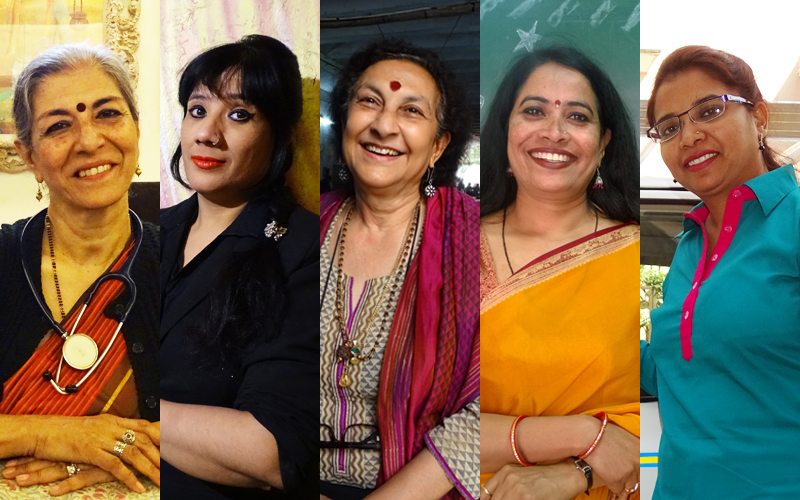
This International Women’s Day, DSSC is celebrating women whose efforts have helped emancipate their gender & champion our society towards progress. These social soldiers work tirelessly to make our world a better place, one courageous step at a time. Their struggles, stories, and successes may be distinct, but they’re brought together by the common thread of bravery, kindness and an indomitable belief in their purpose. Meet here Delhi’s five #UnsungHeroes who don their invisible capes as they take on the world one step at a time – from making their mark in male-dominated professions to wildlife to medical aid.
Dr. Gita Prakash – General Physician
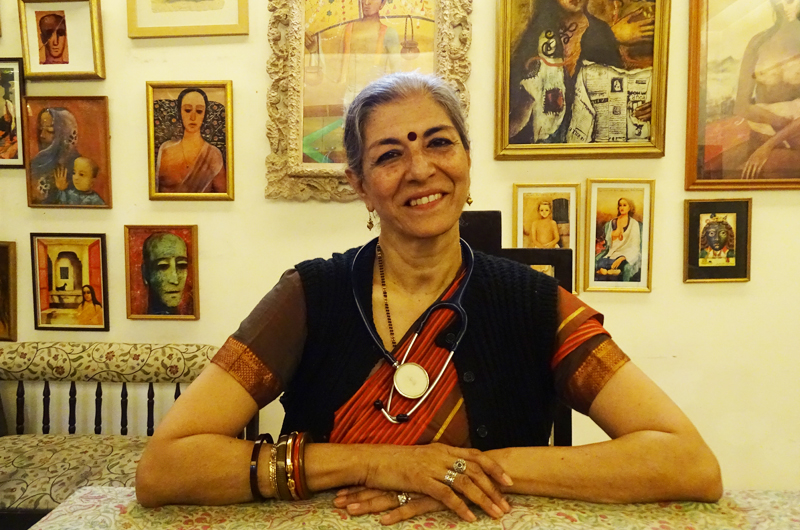
Choose a job you love, and you’ll never work a day in your life – one look at Dr. Gita’s glowing smile and you’ll be a firm believer of this statement (if not already!). With a childhood dream of helping people by curing diseases, Dr. Prakash went on to fulfil it by becoming a General Physician. The triple Masters holder didn’t stop at her staple medical practice, she created a vibrant career by working as a Medical Consultant with the Army, UNHCR, a government school, a renowned radio station, and various banks. One would think that’s sufficient to fill anyone’s plate, but the biggest & her most-cherished portion of her plate is yet to be unveiled – the 62 year old powerhouse lady’s charitable clinic.
“I wanted to help the people who couldn’t afford to go to a proper hospital. The hospitals, especially the government ones simply don’t have enough space, so I’m just doing my little bit to help,” she shares about what prompted her to start the clinic. And so, her drawing room is converted into a clinic every evening since 1985. The welfare clinic operates like clockwork, with her house guard maintaining a strict token system for the patients, to avoid any nuisance for the neighbours. Most of her clientele comprises of the domestic staff from her neighbourhood (Defence Colony). Over the years her enthusiasm to provide aid to the underprivileged has seeped into her neighbours too, “A lot of people nearby now send their staff to me instead of asking them to take care of it themselves, which never happened before!” she says. Starting off with an average of four patients a day, Dr. Gita now consults about 20 every day, and sitting contently at her dining table-cum-doctor’s desk post patient hours, this real life Robin Hood signs off, ”I see myself continuing this for as long as I can, there’s nothing more heartwarming than helping someone in need.”
Meherunnisa Shaukat Ali – Bouncer at Social HKV
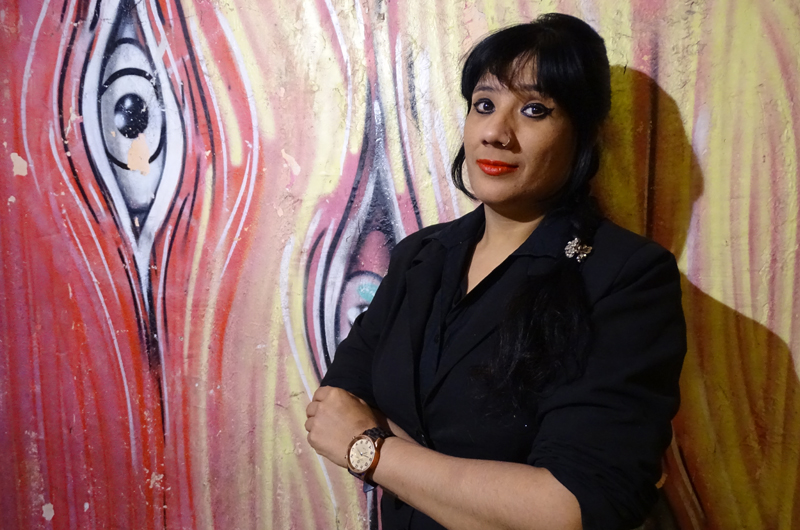
From staying up nights to study under the blanket, hiding from her conservative father, to now staying up nights to protect club goers in the capital, Bouncer Meherunnisa Shaukat Ali has come a long way. Hailing from Saharanpur (UP), Meherunnisa was born to a Muslim father and Hindu mother, who had eloped to marry him against her family’s wishes. Her mother’s LLB degree led her father to believe that “Educating his four daughters will result in them eloping & converting their religion too someday,” as she tells us. Despite the lack of support at that time, Meherunnisa completed her schooling, and today she holds an MA in Hindi Literature. As she began her search for a suitable job, her parents’ ill health & huge losses in the family business forced them to shift to Delhi in 2007. Though she got herself a sales job the salary wasn’t sufficient to support the family, and a chance meeting with an NGO worker led Meherunnisa to her first stint as a bouncer at Jamia Millia Islamia. Seven years later, she now works as a full-time bouncer at Social (Hauz Khas).
The transition, however, was not unchallenging. Explaining late work nights to her parents and silencing the neighbours’ comments was her biggest hurdle, “People used to see me come back home and say ‘don’t know what work she does so late at night’. Initially even my father was against it, but he gradually realised that I was earning for the family and not doing anything ethically wrong.” As one of the first female bouncers she was also faced with the task of validating her profession among her peers, “I used to fight with my colleagues to have them address me as a bouncer and not a security guard. In the beginning they made fun of me, but seeing my determination they finally came about. Now whenever someone calls me a bouncer I feel proud,” she shares. Fighting for her rights is not new to Meherunnisa, and through her work she hopes to encourage other women too, “If I can have faith and go beyond gender roles, so can anyone else,” she says. When asked whether Delhi’s streak for violence is a threat in her profession, she responds, “If women stand up for their own safety, no one can harm them. We shouldn’t pay heed to being called the weaker section, it is up to us to empower ourselves and not be scared of anyone.” With that spirit afire Meherunnisa shares her aspiration to become a Personal Security Officer soon, before she turns around to wo(man) the crowd pouring in the club.
Geeta Seshamani – Vice President, Friendicoes
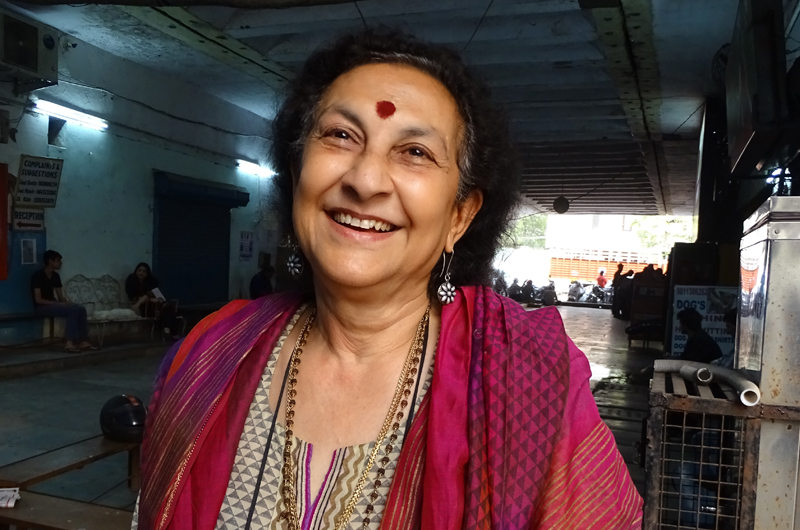
If there is a face for animal welfare in Delhi, it is Geeta Seshamani. Championing the cause for over 35 years now, she’s dedicated her life towards making ours a more compassionate society. An Associate Professor at Gargi College (DU), she’s also the Vice President of Friendicoes & Co-Founder of Wildlife SOS. “In my mid 20s I saw a dog in a road accident, with no proper treatment available to it – this incident spurred me to join hands with Friendicoes, which was back then simply a kindness club run by school children,” she says about how her fight for animal rights began. As the club gained strength, it was registered as a society, Friendicoes SECA, in 1979. However, it was still channelled by a few passioned persons like herself, “I used to cook for the animals in my own kitchen and my personal car was used as the ambulance. And I loved it, I realised I was receiving much more than what I was giving to these animals – about patience, endurance, and having a big heart.” Geeta has helped Friendicoes grow from a club to an NGO which now hosts a mini-hospital of its own – from a clinic, operation theatres, an ambulance service, laboratories, etc.
With Friendicoes doing its bit for domestic animals, Geeta recognised the need for a separate system to cater to wild animals, and thus Wildlife SOS was formed in 1995. In the last 22 years she has collaborated with the governments of several states to implement eight rescue & rehabilitation facilities. She also served as a member of the Animal Welfare Board of India for nine years, taking the opportunity to conduct training programmes & spreading awareness across the country. “The one challenge I’ve faced is to make people realise that there’s dignity in serving animals. Indian culture stands for respect for all, but with time we’ve lost tolerance for beings other than ourselves – we need to bring back that compassion,” she says about how each person can make a difference. Before Geeta returns to her tireless efforts for the wellbeing of all animals we ask her the one change she’d like to see, and she answers, “I want the authorities & the society to realise the importance of animals in our ecosystem. From cows to owls, each animal has a specific, important function in our ecosystem and we need to start preserving that rather than damaging it.”
Anupama Singh – Mentor Teacher, Delhi Government Senior Secondary Schools
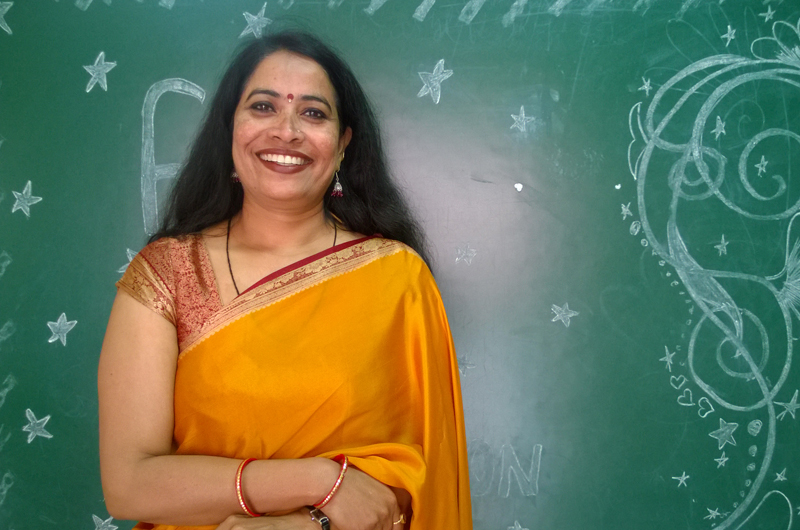
Bringing to the fore the cause of special needs children is Anupama Singh. A national level volleyball player and an MA in Economics, she chose to pursue her passion of teaching sports – which she continues to do for the last 24 years. It was when Inclusive Education for children with disabilities was started in the country that Anupama found the stirrings of a zeal to fight for their rights, “What compelled me was that these students took admission because a law existed, but they were considered a burden by the teachers & terribly neglected, resulting in zero self-confidence among them.” That was seven years back, since then Anupama has helped not only to integrate special needs students but also help them succeed; under her training then 17 year old Pushpa Kadyat won four medals at the International Special Olympics 2015, and seven more have reached the national level since then. Supporting these children was no easy feat, “My colleagues considered me to be a crazy person for assisting these kids in my personal time. As for my family, there was no convincing them initially – I had to hide and help my students!” she shares. “My goal was to make the parents & teachers realise that these children are human too,” Anupama adds, and since 2010 she has called for the counselling of numerous students whose disabilities had gone unidentified till then. Again, the task wasn’t without obstacles, “The parents were not even ready to attend the counselling. I had to lure them using the disability pension to get them to a session, and finally accept their child’s reality,” she tells us.
However, the tables turned as Anupama’s unwavering grit took many students to state and national level Special Olympics; and now the parents approach her asking what sport will their child excel in. While she says she’s happy with the positive change in accepting the special needs children, Anupama urges the people to not just say ‘every child is unique’, but adopt the motto in our interaction with each child. Currently she’s furthering their cause as a mentor under the Delhi government’s school education reform programme ’Chunauti 2018’, and seeks to bring individualised skill development to each special needs student in the coming years.
Sophia Akoijam – COO, Sakha Consulting Wings Pvt. Ltd.
Breaking the glass ceiling in the driving profession is Sakha Consulting Wings, a cab service run entirely by women. “Meenu Vadera set up Sakha in 2008 with a vision to provide employment opportunities to economically deprived women in the field of driving,” Sophia Akoijam, Chief Operating Officer at Sakha, tells us. Making space in a male-dominated profession is akin to cracking concrete, and Sakha prepares its drivers for the same by giving them training in self defence, women empowerment, and personality development. This is done by Sakha Cabs’ sister organisation, Azad Foundation, which is responsible for mobilising the female drivers. “We want these women to grow & become entrepreneurs themselves. While some have moved on to lucrative jobs with hotel taxis, few have started their own cab services,” Sophia shares proudly. While Sakha helps these women receive training, attain licenses, and get employed as private or commercial drivers – that isn’t their sole aim; their goal is to groom these women into independent individuals who can accomplish financial freedom on their own in any career they choose. Their work has been recognised by the people and authorities alike, with their first driver being placed with DTC in 2015, and a tie-up with Delhi Commission For Women helpline.
The success didn’t come without its own set of difficulties, “The first was convincing the women’s families to let them enter this profession; the second was making the patrons accept the concept of Sakha; and lastly it was trying to bring a structure to the system and having Sakha drivers employed under contracts – something private employers had never done before,” Sophia says. Overcoming these challenges Sakha now has 16 cabs & 20 drivers in the city, which remain overbooked, as Sophia happily reports. They also have a presence in Jaipur, Kolkata, Indore, and Ahmedabad, and vow to keep working towards empowering women and help them be the change they want to see.
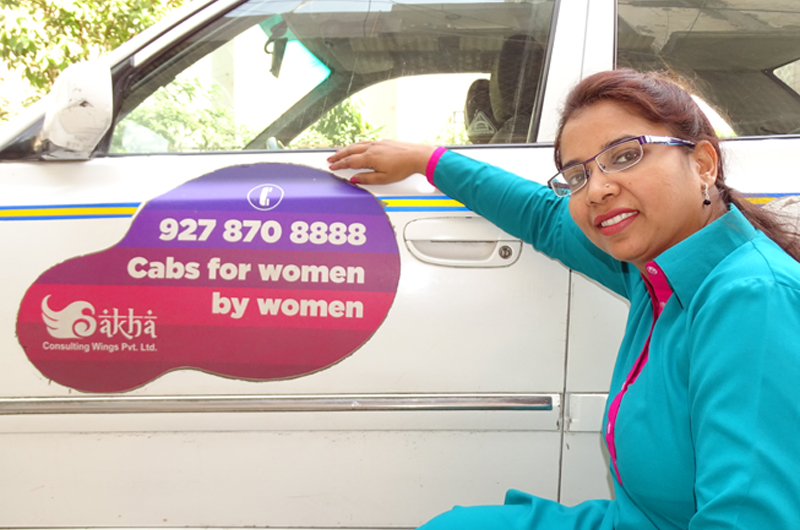
We got talking to Tulsi, a driver with Sakha Consulting Wings, and posed few signature DSSC rapid fire-esque questions – as no interaction is complete without that!
Q. What made you take up this profession?
Tulsi: I had a three-fold reason for joining Sakha. The first being that it will encourage women around me to become independent themselves. Second, the more women out in public, the better it is for our safety as it won’t be a ‘big deal’ that women are out alone at any time of the day/night. And thirdly, it provides women with an alternative mode of transport.
Q. How’s the customer’s response when they see a female driver, has it changed over the years?
Tulsi: The reaction hasn’t changed with time, the customers are still shocked or surprised to see a female cab driver. There have been many incidents when clients cut the phone call on hearing a female voice or ask for the driver, and we have to tell them that we are, in fact, the drivers!
Q. What is the one thing that you’d like to change about the people’s attitude in this city, in relation to your work?
Tulsi: People should start believing that no job is solely a ‘man’s job’, woman deserve an equal chance to perform the same tasks. The society mistrusts women who have late work nights, instead they should understand the profession and let women step out into the world and take charge of their lives.
With that we doff our hats to these ace women who’re changing the world one bold & kind move at a time; and clink our glasses to seeing this list grow every year!

